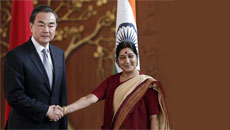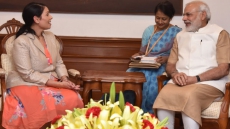Known largely as a poor man's crop and rich man's food, the leafy moringa, or drumstick tree, is an important tool to fight nutrient deficiency in the wake of climate change, says noted development practitioner Basanta Kumar Kar, terming it a naturally-occurring bio-fortified crop suited to India's climatic conditions.
Moringa is included in the array of such nutrient-enriched produce as oranges, sweet potatoes, minor millets, amla and others which are key to combat micronutrient deficiency in the climate change scenario, said Kar, opining that genetically modified foods are not sustainable solutions.
Kar is a 2016 Global Transform Nutrition Champion for South Asia and senior advisor at The Coalition for Food and Nutrition Security (India).
He believes in a food-based approach and sustainable climate-smart agriculture to tackle problems of malnutrition triggered by climate change.
This includes bringing out a comprehensive and mandatory food fortification regulation with a focus on bio-fortification, a process by which the nutritional quality of food crops is improved naturally through agronomic practices, conventional plant breeding, or modern biotechnology.
"We are arguing with the government to bring out a comprehensive food fortification regulation with an emphasis and focus on bio-fortification," Kar explained.
Bio-fortification differs from conventional fortification in that it aims to increase nutrient levels in crops during plant growth rather than through manual means during their processing.
"We are urging the government to establish a bio-safety authority, map our flora and fauna and promote awareness about nutrition-rich crops and species. Genetically modified food is not a sustainable solution for the future. There is a gold mine of naturally enriched crops and species which are invisible and often ignored," Kar said.

And the humble moringa, described as a "miracle tree", extolled for centuries for its medicinal properties in India, could make a big splash in that direction, in the country where the nutrition scenario for children remains bleak, Kar contended.
Vitamin and mineral deficiencies are highly prevalent throughout the developing world and 90 per cent of the developing world's chronically under-nourished (stunted) children live in Asia and Africa, according to Unicef data. In India, 18 per cent of children under five years of age suffer from wasting due to acute under-nutrition.
With climate change acting as a hunger risk multiplier in Asia, Kar stressed that moringa, a power food (a serving of fresh leaves has more vitamin C than seven oranges) and other naturally enriched nutritious crops and species are important in tackling the problems of micro-nutrient deficiency and food insecurity without damaging the ecology.
"It is rich in micronutrients, vitamins and minerals and adapted to local climatic condition. It is drought resistant and less water is required for its cultivation," said Kar who has been involved in many successful nutrition initiatives in South Asia (particularly in India and Bangladesh).
Kar and his colleagues were instrumental in pushing for integration of nutrition in the Swachh Bharat Abhiyaan. Prior to this, in 2013, he also worked with stakeholders to support the Fortification in Edible Oil with Vitamin A Bill, 2013, that the Bangladesh parliament passed.
Drawing from his own fight against poverty and malnutrition as a young boy in Orissa (now Odisha), Kar, now Delhi-based, highlighted the big picture linking climate change, food security and nutrition.
"Like the green and white revolutions, India needs a nutrition revolution to transform the country into one without malnutrition.
"The Green Revolution was based on water-intensive crops and over the years we have seen a depletion of water...a scarcity of water which is manifesting in terms of drought. From one of our own studies, we have shown the depletion of micro-nutrient levels in the soil and ultimately leading to the lowering of micro-nutrient levels in food crops, due to climate change, flood and saline inundation," he said.
For example, in Bangladesh, Kar said, a decrease in zinc content in rice has been observed because of its shrinking levels in the soil.

"It's happening because of climate vulnerability. At the same time, carbon emissions because of pesticide and fertiliser use has gone up. We have pitched the idea of promoting climate smart organic agriculture and bio-fortified crops to the Indian government and they are positive about it," Kar added.




